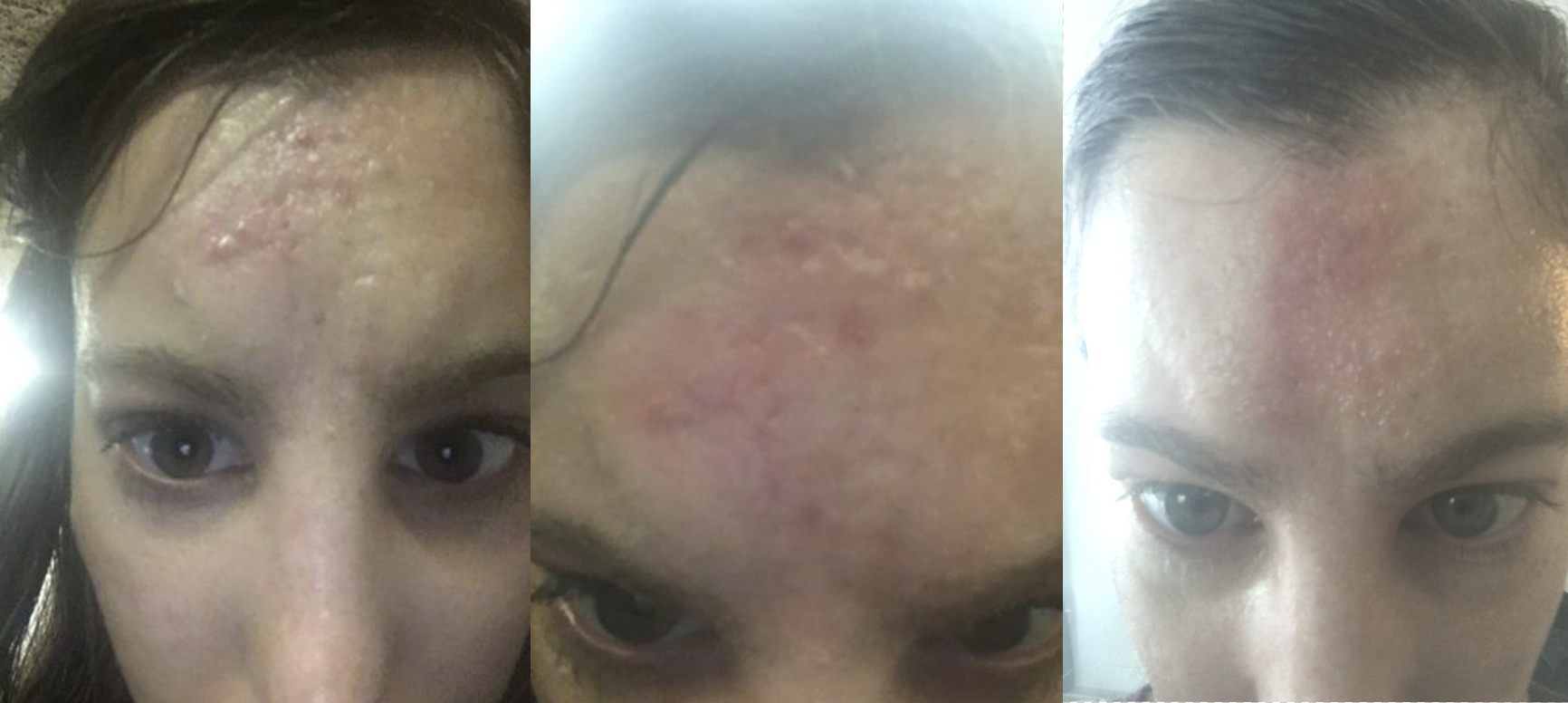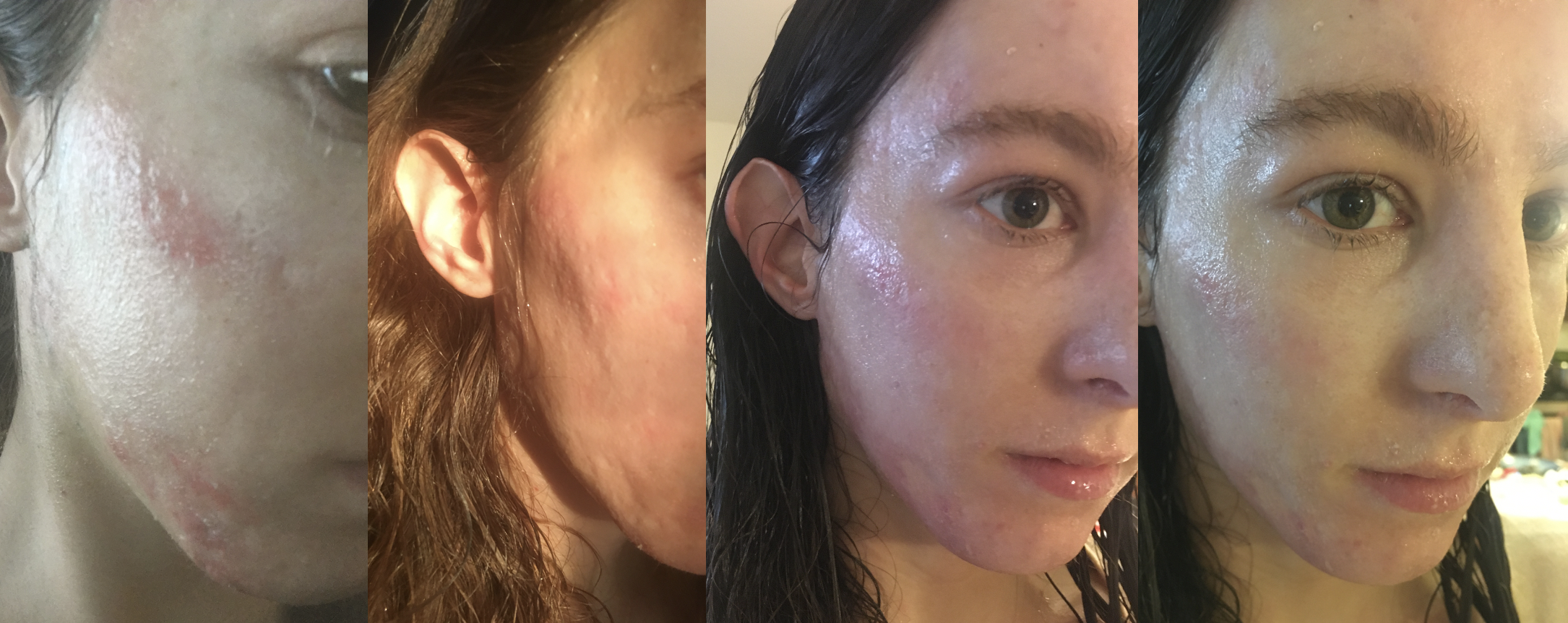Why do Acne Scars Form?
Acne scars form due to the healing of inflamed acne blemishes. When the acne is small enough, the scars are mild and heal quickly on their own. Other times, the blemish spills into the surrounding tissue and creates deeper scarring.
The two main types of acne scarring is indented and raised. Acne scars are indented when they form due to a tissue deficit, and they are raised when too much collagen is produced during the acne wound repair.
Those with darker skin are more prone to raised scarring, which is more likely to happen to darker skin types as a healing response whether that is to acne or other types of skin injuries.
Vitamin C for Acne Scars
Does Vitamin C help improve acne scarring?
Acne scarring forms more often due to long-term or severe cystic acne, but it can also form from less severe cases as well. Picking at acne and genetic makeup can contribute to whether you get acne scarring as well.
Indented scarring is the result of too little collagen produced, making Vitamin C is a great treatment to help the skin regenerate and produce more collagen to heal.
Raised scarring, however is the result of too much collagen produced during healing, meaning Vitamin C and other topical treatments won’t be much help. In the case of raised scarring you’d need to go to your dermatologist to get their recommendation which may either be surgery, injections, or other types of gel treatments.
Vitamin C Serum for Acne Scars
Healthline explains how Vitamin C helps with the collagen rebuilding process and acne scarring, “Vitamin C treats acne scars by increasing the synthesis of collagen, a protein responsible for your skin’s structure and vital for rebuilding healthy skin. As a result, this vitamin may accelerate the healing of acne wounds.”
Vitamin C plays an important role in skin’s rebuilding of collagen, which is one way it helps the skin rebuild acne scarred areas to help them heal more effectively.
The Wang, Jiang, Li et al study found that, “Normal skin needs high concentrations of vitamin C, which plays many roles in the skin, including the formation of the skin barrier and collagen in the dermis, the ability to counteract skin oxidation, and the modulation of cell signal pathways of cell growth and differentiation.”
Vitamin C is found in high levels normally in the skin and it plays many roles, including oxidant protection, a role in cell growth and the formation of new skin.
This is why Vitamin C is so helpful in getting rid of red acne scarring and discoloration in the skin.
The Journal of Clinical and Aesthetic Dermatology found that Vitamin C protects against photoaging, ultraviolet-induced immunosuppression, and photocarcinogenesis.
These are reasons Vitamin C is known for adding an extra layer to protect skin from the sun, when used in combination with regular sunscreen.
Best Vitamin C Serum for Acne Scars
L-ascorbic acid (LAA) is the most chemically active, naturally occurring, and most potent form of Vitamin C.
L-ascorbic acid is also the form of Vitamin C most susceptible to oxidizing, which means it turns from clear to a yellow-ish color and expires more quickly than other more stable, yet less active forms of Vitamin C.
When looking for a Vitamin C serum, looking for one with L-ascorbic acid is the way to get the naturally occurring, most active form of Vitamin C.
Studies, including the Pumori study, have also found Vitamin C to be the most effective at a higher concentration, up to 20%, so getting a 20% Vitamin C serum has been found to have the most benefits.
The Pumori study also explains the best benefits are achieved by applying the Vitamin C every 8 hours because Vitamin C serum has a half-life of 4 days, and you need a persistent reservoir of Vitamin C in the skin for adequate photo protection, which can be achieved with regular 8 hour applications.
There are different benefits of Vitamin C, including photo protection, but also benefits specific to acne scarring including decreasing inflammation and redness, and giving the skin ingredients to help repair and build collagen.
The acnescar.org Vitamin C serum is one of the best Vitamin C serum for acne scars, due to its use of the most chemically active naturally occurring L-ascorbic acid.
How Does Vitamin C help with acne scarring?
Vitamin C is an ingredient that’s topical application has been found to help with skin healing and collagen production.
Specifically it has been found to help indented acne scarring as well as pigmented red acne scarring, but not raised acne scar types.
How Does Vitamin C Help Indented Acne Scars?
The Clinical and Aesthetic Dermatology study by Al-Niaimi and Chiang goes on to explain how Vitamin C helps in the collagen and skin repair process:
The study found Vitamin C’s role in increasing collagen synthesis, stabilizing collagen fibers, and decreasing collagen degradation to have an anti-aging effect.
Vitamin’s role in the collagen formation process is why it can help give the skin what it needs to help indented acne scarring heal by forming new smooth collagen, especially when used in conjunction with micro-needling which also kickstarts the skin’s healing process at a deeper level and opens the skin to receiving healing ingredients.
How Does Vitamin C Help Pigmented Acne Scars?
The Al-Niami and Chiang study found that Vitamin C decreases melanin formation, thereby reducing pigmentation. Vitamin C is the primary replenisher of vitamin E and works synergistically with vitamin E in the protection against oxidative damage.
The study concluded by saying that the topical application of Vitamin C helps the skin with a variety of anti-aging, anti-pigmentation and sun-protective properties.
The Pullar, Carr, Vissers study goes into detail to explain how Vitamin C derivatives work to treat skin hyperpigmentation such as the hyperpigmentation that occurs from certain types of acne scarring, “Vitamin C derivatives, including the magnesium phosophate ascorbyl derivative, have been shown to decrease melanin synthesis both in cultured melanocytes and in vivo.
The decrease in melanin synthesis has an ability to interfere with the action of tyrosinase, the rate-limiting enzyme in melanogenesis.
Agents that decrease melanogenesis are used to treat skin hyperpigmentation in conditions such as melisma or age spots.”
In simple terms, Vitamin C can interfere with an enzyme called tyrosinase which is responsible for the production of melanin, a natural skin pigment.
This process is what allows Vitamin C to help brighten skin dark spots and hyperpigmentation spots caused by acne scarring.
Micro-needling and Vitamin C for Acne Scars
Vitamin C alone is a great way to fully treat discolored and pigmented acne scarring and can be effective when treating mild cases of indented scarring.
When scarring is deeper and affects more layers of skin, it is helpful to use other treatments in combination with Vitamin C to reach the deeper layers of scarring.
A 4 week PubMed study of 30 people by Simran Chawla found moderate improvement in acne scarring of the majority of participants. Specifically 23 of the 27 participants who finished the study saw improvement in their acne scarring of either one or two full grades. 3 of the original participants are not counted in this analysis as 2 participants were lost to follow up and 1 dropped out due to pregnancy hypertension.
Very good results were found with micro-needling and Vitamin C, however even better results were found when micro-needling was combined with PRP, making both effective acne scar treatments.
The study found that “Vitamin C combined with micro-needling also showed improvement with respect to firmness and smoothness of skin; as well as post inflammatory hyper-pigmentation.”
The deeper the scarring, the harder it is to fully treat, however micro-needling, Vitamin C and PRP all had positive effects on all types of indented and hyperpigmentation scarring.
Micro-needling has been found in other studies including El-Domyati et al to kickstart collagen production and improve the appearance of acne scars. It also has the benefit of opening skin up to better receive healing ingredients including Vitamin C which also contributes to the skin’s healing and collagen production processes.
The study found a statistically signifiant increase in collagen types I, III, and VII as well as an increase in newly synthesized collagen as well as improvement in the atrophic acne scarring.
Compared to the baseline, patients’ evaluations revealed noticeable clinical improvement in atrophic post-acne scars in response to skin microneedling. There was a statistically significant increase (p<0.05) in the mean of collagen types I, III, and VII and newly synthesized collagen, while total elastin was significantly decreased (p<0.05) after the end of treatment. The takeaway is that both micro-needling and Vitamin C have been found alone and together in clinical studies to increase the skin's healing and collagen production process as well as to improve the appearance of indented and discolored acne scars.
Does Vitamin C Help Active Acne?
Vitamin C is known for its anti-inflammatory property, which may help decrease swelling and redness when applied to acne.
A 12 week PubMed study of 50 people found that, “61% of participants who used a lotion containing 5% sodium ascorbyl phosphate (SAP) — experienced significant improvements in acne lesions, compared with a control group.”
Another 8 week, 30 person PubMed Study found that, “those who used 5% SAP had a 48.8% reduction in acne lesions. What’s more, those who used a combination of SAP and 2% retinol — a vitamin A derivative — had a 63.1% reduction.”
These studies indicate that for about half of people the topical application Vitamin C as well a combination Vitamin A will improve acne lesions, while for half it while not.
In conclusion if you have active acne it could be something to try to see if you are one of the ones it will work for.
Vitamin C Acne Scar Before and After Results
I’ve suffered from very severe indented acne scars as well as some discolored acne scarring for years after I had deep cystic acne.
I tried a ton of creams and nothing worked for me for years until I finally worked up the courage to go to the dermatologist and get a professional opinion.
They recommended I do micro-needling as well as apply copper peptides and Vitamin C for skin healing.
I did one professional micro-needling session and saw some improvement. It was then I started researching more, and started at-home micro-needling 1-2X a month with the daily application of copper peptides for acne scars at night and Vitamin C serum for acne scars in the morning.
Every month I would see improvement in my skin’s indentations as damaged layers came off, and new skin repaired itself underneath.
I’ve been treating my skin this way for over a year and my scarring has improved to the point it is either all the way gone in some areas or almost gone in the areas that were the deepest originally.
Here is a view of my forehead, which contained the deepest most severe scarring, before and after my year of at-home micro-needling, Vitamin C and copper peptide treatments:

Here is the side of my face, which had mild to moderate indented scarring as well as discolaration scarring, before and after as well:

You can view more acne scar before and after images here as well.
